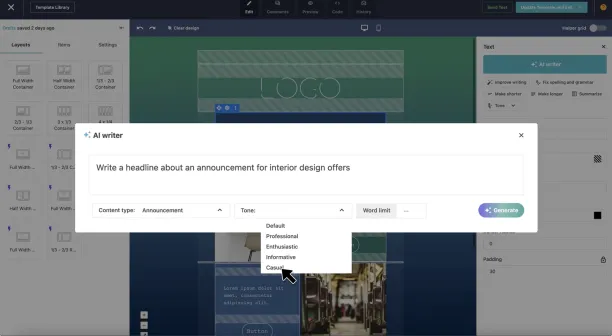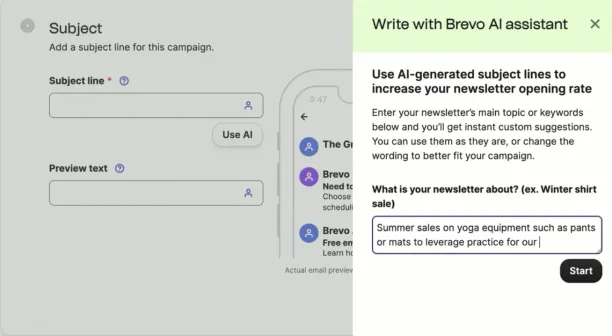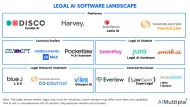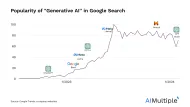Top 7 Applications of Generative AI for Email Marketing in 2024
Generative AI for email marketing plays a transformative role by introducing automation, personalization, and innovation into various aspects of email campaign creation and management.
From crafting targeted content to personalizing emails to generating dynamic product recommendations within emails, utilizing generative AI for your email marketing efforts would allow you to:
- streamline automated processes,
- enhance creativity,
- deliver personalized experiences,
- redefine how brands communicate with their customers for more successful marketing outcomes.
Discover the applications and case studies of generative AI in email communication, the benefits and challenges of utilizing generative AI as well as tips for implementing generative AI into your email campaigns.
Applications of generative AI for email marketing
Generative AI tools create personalized content by leveraging large language models (LLMs) capabilities. Using LLMs trained on vast amounts of user data would enable identifying and generating personalized text and images based on the input they receive. Email marketers can utilize generative AI to create engaging and unique content in line with their email marketing strategy.
Focusing on personalization for email marketing is essential to increase customer engagement and retention. Users enjoy highly personalized content as 78% stated that they tend to repurchase such products with personalized content.1
Here are the top 7 applications of generative AI that you can use for your email marketing campaigns:
Applications with text and image generation
1. Personalized text and email content creation
Leveraging AI text generators to create custom email content would increase personalization and eventually boost customer satisfaction for your email campaigns.
Generative AI tools have the capability to analyze customer behavior and interactions, buying intents, and demographic details. This enables the crafting personalized emails and marketing materials.
AI text generation tools support generating personalized communication that would enhance the recipient’s engagement with your brand, potentially lead to higher open and click-through rates, and ultimately, improved conversion rates.

Figure 1: Moosend AI text generator feature example.2
2. Generate email subject lines
Generative AI allows creating engaging and effective subject lines and it is designed to improve open rates of emails by capturing your recipients’ attention.
Data analysis: This process starts by analyzing customer data, including previous email campaigns, recipient behaviors, and engagement metrics to understand which emails were opened, which were ignored, and the specific characteristics of successful subject lines.
Understanding user preferences: These tools learn from the data to understand the preferences and behaviors of the target audience. It identifies patterns, such as words, phrases, or structures that led to higher open rates previously.
Natural Language Processing (NLP): Generative AI utilizes machine learning algorithms that can understand and generate natural language texts to craft subject lines that sound natural, engaging, and are tailored to the audience’s interests and habits.
A/B testing: With generative AI tools, you can also automate the process of A/B testing by generating multiple subject lines for the same email and testing them on a small segment of the audience.

Figure 2: Brevo subject line generator example.3
3. Generate call-to-action (CTAs)
With generative AI, you can create personalized CTAs by incorporating user-specific data, such as a recipient’s name, past interactions, and preferences.
Generative AI can also generate multiple variations of CTAs for A/B testing which would allow marketers to test different versions to see which performs better. To further refine future CTAs, generative AI learns from the previous preferences and identifies possible improvements for more effective CTAs.
To ensure that the generated CTAs are not only effective but also consistent with the brand voice, generative AI follows brand guidelines and regulatory requirements.
4. Image generation
Visual generative AI tools can help create personalized images that you can include in your email marketing messages. Some of the examples of image generation include:
Product visuals: Generative AI tools enable the production of realistic product images for email marketing, social media, and more.
Branding: Leveraging generative AI, you can design brand logos and other visual components for your email content to enhance your brand voice.
Advertising graphics: Additionally, AI can be employed to craft ad visuals for cold email initiatives which would allow your campaigns to stand out and potentially boost click-through rates and conversions.
Generative AI tools can also craft personalized recommendations and optimized call-to-action buttons tailored in line with your target audience’s preferences and interests.
5. Response automation
Generative AI for email marketing can also support customer service processes by providing timely, relevant, and personalized responses to customer inquiries or actions.
Automated response generation works by:
Analyzing customer interaction: The process begins by analyzing past customer interactions, including emails, chat logs, and other communication forms.
Natural Language Processing (NLP): NLP allows to comprehend the intent behind a customer’s message and create a contextually appropriate human-like response with the natural language generation capabilities.
Machine Learning (ML): Utilize ML algorithms to identify patterns, adapt to new types of queries, and refine response effectiveness based on feedback and outcomes.
Applications based on audience interactions
Since the 2010s, traditional machine learning tools have been used to reach the right audience at the right time, through the right channel. While these capabilities still mostly rely on traditional machine learning, they are:
- being augmented with generative AI,
- quite relevant to email marketing.
6. Target audience selection
Traditional artificial intelligence tools enable you to effectively categorize your audience into segments by processing and generating insights from large datasets, including user behaviors, preferences, demographics, browsing, and purchasing behaviors which would increase the effectiveness of your email marketing efforts.
- By identifying patterns and correlations in user data, these tools can identify audience segments that share distinct characteristics or behaviors and generate multiple variations for email marketing campaigns.
- The role of generative AI for target audience selection is enabling dynamic segmentation to continuously update audience segments based on new data. This approach would ensure that the target audience selection remains relevant and accurate over time.
As generative AI systems learn from each campaign’s outcomes, these systems would adjust the algorithms to improve future audience selection. This continuous learning process enhances the precision of targeting over time that would lead to more effective campaigns in line with your email marketing strategy.
7. Delivery time selection and optimization
Marketing email delivery time optimization with generative AI involves using artificial intelligence to analyze user data to predict the most effective times to send marketing emails to different segments of your audience. This process aims to increase email open rates, click-through rates, and overall campaign effectiveness:
Data collection: The process starts by gathering data from various sources, such as past email campaign performance, subscriber engagement patterns (when they typically open emails), user’s demographic information, and general market trends.
Identifying patterns: With machine learning algorithms, AI systems analyze the collected data to identify patterns and correlations. For example, it might learn that certain segments of your audience are more likely to open emails early in the morning, while others engage more in the evening.
Predictive modeling: Based on these patterns, it develops predictive models to forecast the optimal sending times for each segment of your audience.
Case studies of generative AI for email marketing
WinstonAI by Dotdigital
Dotdigital has integrated a feature called WinstonAI into their platform that provides real-time feedback on email content and offers suggestions for enhancing engagement.
WinstonAI is integrated within the email editor and delivers personalized recommendations to refine email copy, adjust tone, and enhance overall content engagement.
It also assists in crafting more effective subject lines by analyzing previous ones and offering tailored suggestions to boost open rates and overall campaign effectiveness.4
Brevo AI Assistant
Brevo email marketing platform’s AI assistant feature enables generating personalized subject lines for email marketing campaigns. By entering a few keywords that are relevant to your marketing campaign, the AI assistant feature creates suggestions for effective subject lines while allowing you to regenerate for more suggestions. It also generates texts for email content and call-to-action and provides content improvement suggestions for increased engagement.5
Benefits of generative AI for email marketing campaigns
Utilizing generative AI for email marketing processes allows several benefits:
Increased email marketing efficiency
By automating the creation and optimization of email content, generative AI minimizes the time and resources needed to execute effective email campaigns.
It can generate subject lines, body content, and personalized images at scale while allowing marketers to focus on strategy and creative direction rather than manual content creation.
Additionally, AI-driven A/B testing and analytics streamline the process of optimizing campaigns. This automation and efficiency can transform email marketing from a time-intensive task to a more streamlined, effective process.
Smooth adaptation to real-time changes
Generative AI systems are capable of adapting to real-time changes in customer behavior and market trends. For example, if a sudden spike in interest in a specific product or topic is detected, it can immediately adjust the AI generated content of outgoing emails to follow this trend.
This agility ensures that email marketing campaigns remain relevant and timely which would improve the customer engagement rates.
Customer experience
The combination of personalized content, timely communication, and visually appealing emails contributes to a enhanced customer experience. Customers are more likely to engage with emails that feel relevant and valuable to them, and this positive interaction with the brand strengthens their loyalty and satisfaction.
Additionally, AI-driven automated responses ensure that customers receive timely and helpful support, which would further enhance their experience and relationship with the brand.
Data-driven insights
With generative AI, you can also analyze engagement and performance data that would provide actionable insights. By understanding what content performs best for various segments of the audience, most marketers can refine their strategies to better meet the needs and preferences of their target market.
AI-driven analysis can identify patterns and trends that may not be immediately apparent that would offer a deeper understanding of customer behavior and preferences. These insights drive more informed decision-making and enable continuous improvement of email marketing strategies for better results.
Check out email marketing benchmarks to learn more about the key metrics that affect email marketing performance.
Challenges of generative AI for email marketing
While generative AI offers various benefits for email marketing, it also presents several challenges that marketers need to consider:
Security and ethical issues
Ethical and privacy concerns in generative AI for email marketing revolve around the responsible collection, use, and management of personal data, as well as transparency in the deployment of AI technologies. These concerns are critical due to the potential for misuse of data and the implications of AI-generated content on user perceptions and trust.
Ensuring compliance with data protection regulations like GDPR and CCPA is crucial for email security.
Copyright concerns of AI-generated works is another issue that you need to acknowledge when using generative AI products. To mitigate copyright concerns, you should clearly identify the most suitable use cases for your business and follow generative AI ethical codes.
To learn more about the ethical concerns and risks stemming from generative AI, check out our generative AI ethics and risks of generative AI articles.
Overly relying on automation
There’s a risk of becoming too dependent on generative AI for email marketing content creation, which could lead to a loss of personal touch or authenticity in communication.
While AI can generate personalized content, it might not fully capture the brand’s voice or the nuances of human empathy and emotion, which are essential in building genuine customer relationships.
Lack of integration capabilities
Integrating generative AI tools with existing email marketing platforms and workflows can be technically challenging.
Ensuring smooth integration requires both technical expertise and resources, which might not be readily available in all organizations.
Best practices for effective generative AI implementation in email campaigns
To leverage the potential of generative AI for email marketing while navigating its complexities, consider the following tips:
Build on the right foundations
Email marketing is one application among hundreds of generative AI applications. Most of these applications can be built on a common enterprise generative AI technology stack. AIMultiple recommends:
- large businesses to leverage such a common tech stack to leverage economies of scale,
- SMEs to use best of breed solutions to keep their costs down and progress fast without needing to hire in-house generative AI teams.
Prioritize data privacy and ethics
Ensure your user data collection, storage, and processing practices comply with data protection laws like GDPR and CCPA.
Be transparent with your audience about the use of AI in your email campaigns and maintain ethical standards in content generation to build trust and respect user privacy.
Selecting the right AI email marketing tools
Choose generative AI tools that align with your business objectives and consider factors such as ease of use, customization options, scalability, and customer support.
Focus on data quality
The effectiveness of generative AI for email marketing relies on the quality and relevance of the data it’s trained on. Ensure that your data is accurate, up-to-date, and in line with your target audience to generate meaningful and effective content.
Continuous monitoring
Regularly monitor the performance of your AI-enhanced campaigns, collect feedback, and adjust your strategies based on insights gathered.
Continuous learning and adaptation are key to optimizing the use of AI in email marketing.
Train your team
Ensure your marketing team is knowledgeable about the generative AI tools you’re implementing.
Training on how to use these tools effectively, interpret their outputs, and integrate AI-generated content into campaigns is essential for success.
Balance AI and human oversight
While generative AI can automate many aspects of email marketing, human oversight is crucial to maintain brand voice, ensure content relevance, and make strategic decisions.
Testing and experimenting
Leverage A/B testing to experiment with AI-generated content, subject lines, and send times.
Testing allows you to compare the performance of AI-driven strategies against traditional methods and refine your approach based on empirical data.
Staying informed
As the field of generative AI for email marketing is rapidly evolving, staying informed about the latest trends is essential for effectiveness.
Be prepared to adapt your strategies to leverage new capabilities and maintain a competitive edge.
By following these tips, you can effectively implement generative AI in your email marketing campaigns, fostering personalization, engagement, and efficiency while navigating the challenges and complexities of generative AI technology.
External links
- 1. “The value of getting personalization right—or wrong—is multiplying“. McKinsey. Retrieved March 27, 2024
- 2. “Generative AI for Email Marketing“. Moosend. Retrieved March 27, 2024
- 3. “Generate marketing content with the Brevo AI assistant“. Brevo. Retrieved March 27, 2024
- 4. “Generative AI for email marketing: Best practice tips“. DotDigital. Retrieved March 27, 2024
- 5. “Generate marketing content with the Brevo AI assistant“. Brevo. Retrieved March 27, 2024

Cem has been the principal analyst at AIMultiple since 2017. AIMultiple informs hundreds of thousands of businesses (as per similarWeb) including 60% of Fortune 500 every month.
Cem's work has been cited by leading global publications including Business Insider, Forbes, Washington Post, global firms like Deloitte, HPE, NGOs like World Economic Forum and supranational organizations like European Commission. You can see more reputable companies and media that referenced AIMultiple.
Throughout his career, Cem served as a tech consultant, tech buyer and tech entrepreneur. He advised businesses on their enterprise software, automation, cloud, AI / ML and other technology related decisions at McKinsey & Company and Altman Solon for more than a decade. He also published a McKinsey report on digitalization.
He led technology strategy and procurement of a telco while reporting to the CEO. He has also led commercial growth of deep tech company Hypatos that reached a 7 digit annual recurring revenue and a 9 digit valuation from 0 within 2 years. Cem's work in Hypatos was covered by leading technology publications like TechCrunch and Business Insider.
Cem regularly speaks at international technology conferences. He graduated from Bogazici University as a computer engineer and holds an MBA from Columbia Business School.
To stay up-to-date on B2B tech & accelerate your enterprise:
Follow on


Comments
Your email address will not be published. All fields are required.